Consortium News Editor-in-Chief Joe Lauria was in Berlin as the wall fell 30 years ago today. These are some of the images that he captured.
November 9 is an eerily significant day in German history, in which five major events occurred.
- 1848: During the Vienna revolts, left-liberal leader Robert Blum was executed, which led to the crushing of the German March Revolution in April and May 1849.
- 1918: Emperor Wilhelm II was forced to abdicate in the November Revolution by Chancellor Max von Baden, ending the German monarchy and ushering in the ultimately short-lived Weimar Republic. Philipp Scheidemann declared the German republic from a Reichstag window, while just two hours later Karl Liebknecht proclaimed a “Free Socialist Republic” from a Berliner Stadtschloss balcony.
- 1923: The Munich Beer Hall Putsch ended on Nov. 9, a failed coup attempt led by Adolf Hitler, landing him in Landsberg prison, where he wrote Mein Kampf. Under the Nazis, Nov. 9 was a national holiday to commemorate the Nazis killed in the aborted putsch.
- 1938: From Nov. 9 to 10 synagogues and Jewish shops were destroyed and 400 Jews killed in the event known as Kristallnacht, the night of broken glass.
- 1989: The Berlin Wall fell leading to German reunification.
Reunification was not universally cheered in Western Europe. Italian premiere Giulio Andreotti said, “I love Germany so much that I preferred when there were two.” Soviet leader Mikhail Gorbachev agreed to reunification in exchange for an unwritten promise that NATO would not expand to the East, a broken U.S. promise that scuttled the hope of post-Cold War peace and laid the groundwork for today’s tensions in a Second Cold War.
Consortium News Editor-in-Chief Joe Lauria lived in Germany from 1984 to 1988, the last year in West Berlin. He returned to Berlin on Nov. 11, 1989, two days after the wall opened, and recorded these images at the breached barrier.
Joe Lauria is editor-in-chief of Consortium News and a former correspondent for The Wall Street Journal, Boston Globe, Sunday Times of London and numerous other newspapers. He can be reached at [email protected] and followed on Twitter @unjoe .

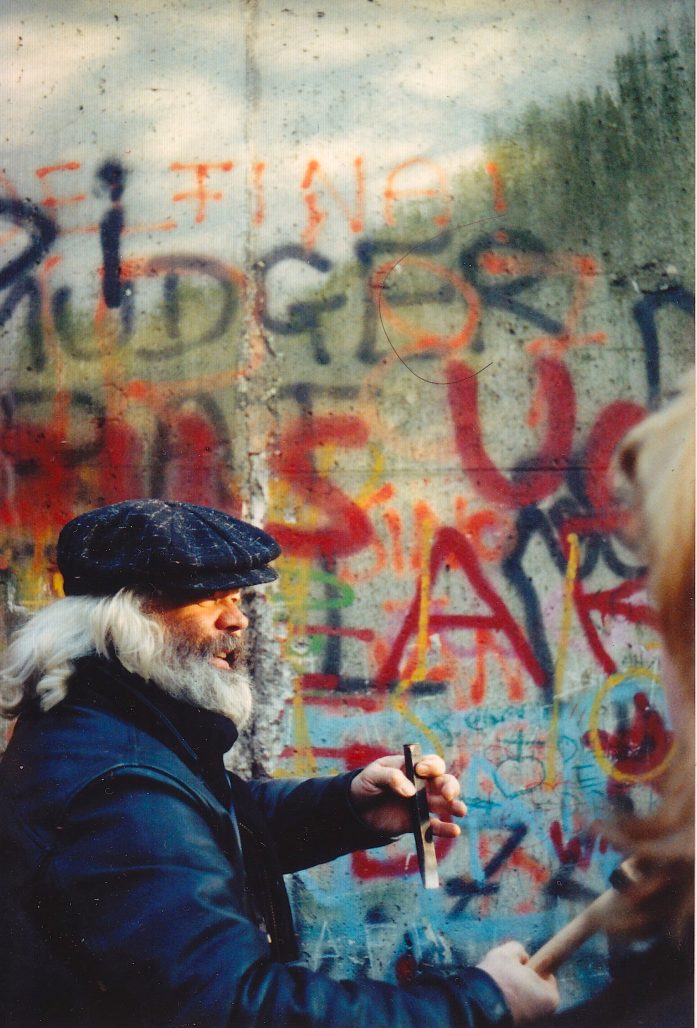
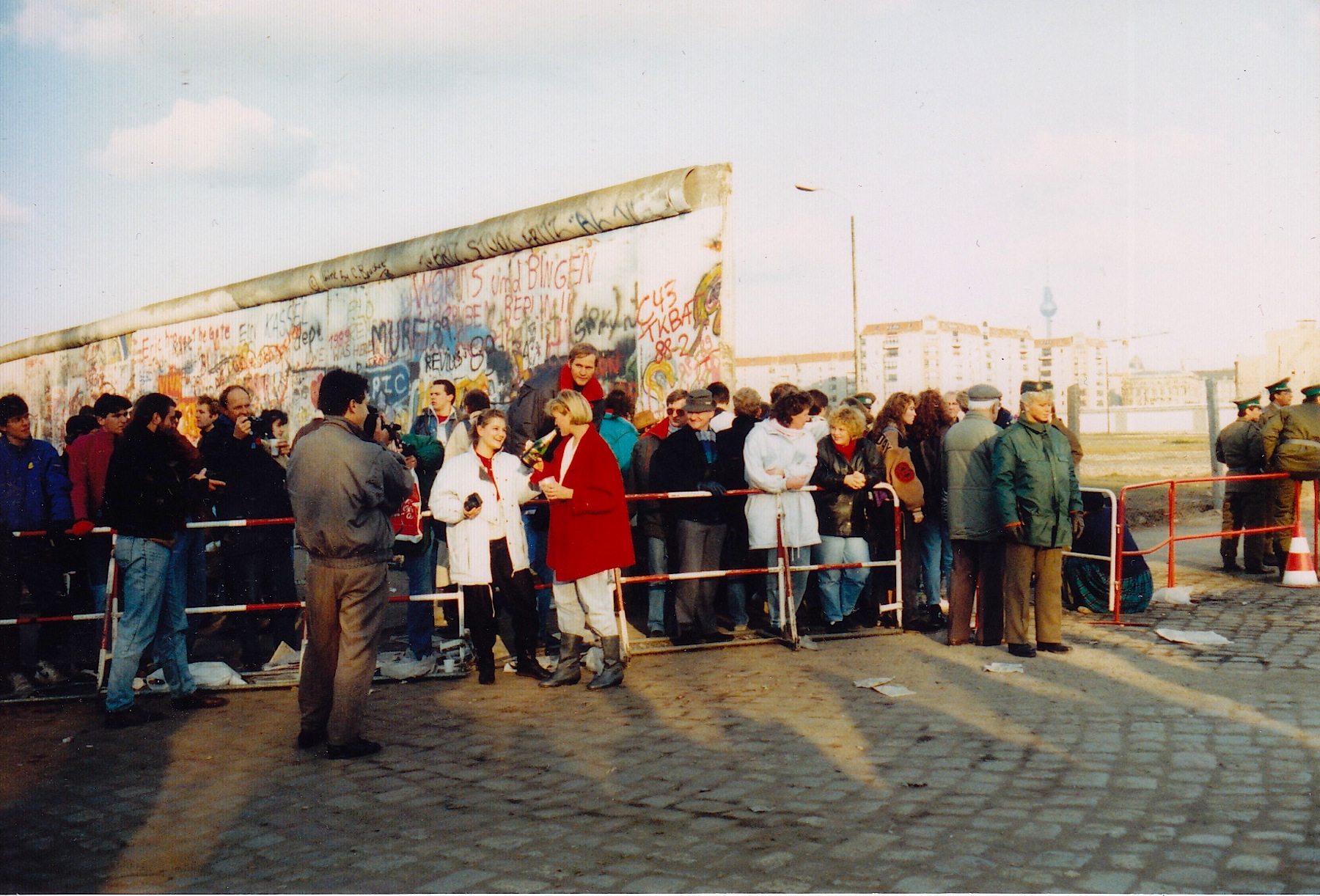
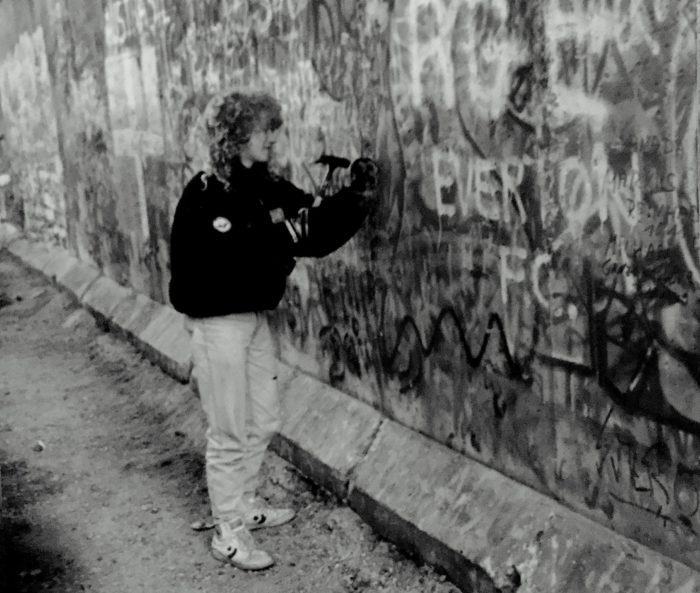
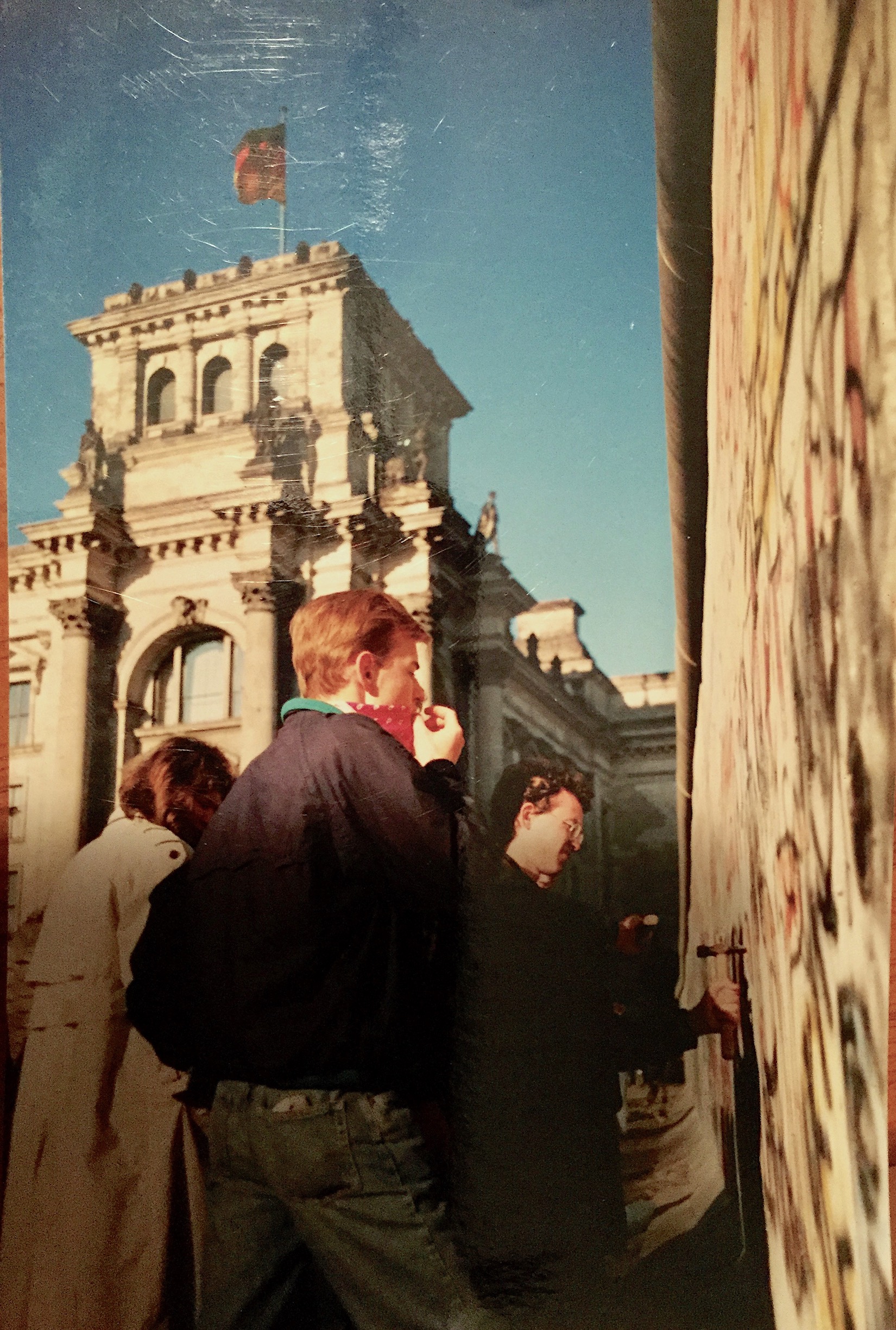

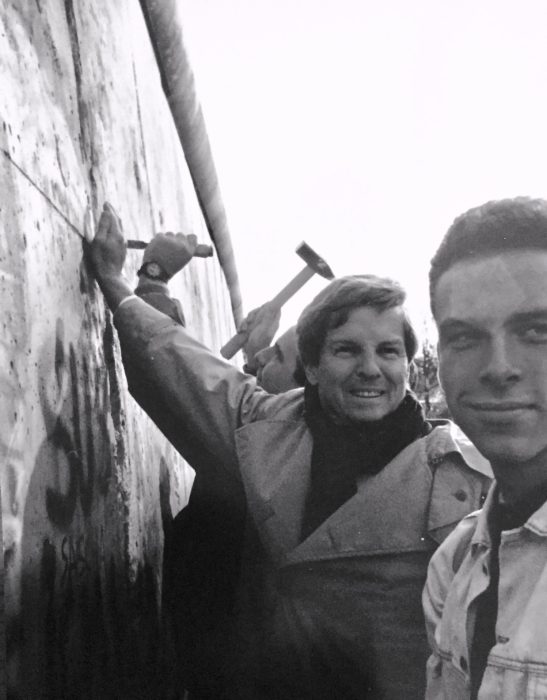


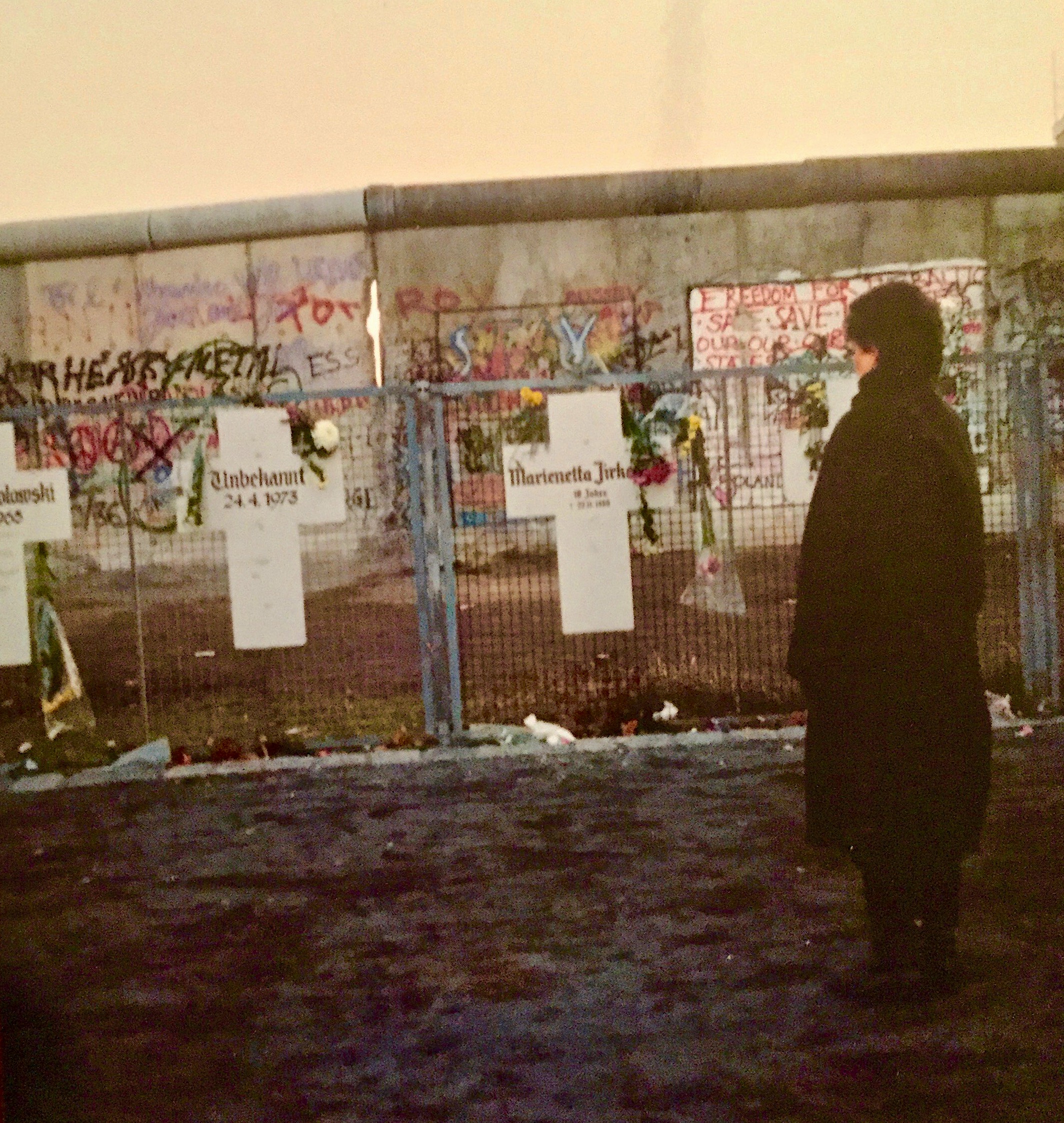
It’s difficult to paint a picture of the DDR (East Germany) that is both attractive and accurate. I recall the dour faces on the railroad platforms, the industrial towers belching effluents under darkened skies in Halle, the awareness on everyone’s part of the pervasive presence of an intrusive State. There was no joy in the land. But let the right lesson be drawn. Neither socialist nor our own economic/political arrangements can function properly when they are recruited in the service of empire. And that held true for both sides. On one side centralized power was state-dominated; on the other, it was corporate-dominated. But economic arrangements were extractive and predatory on both sides. With the piercing of the Wall, East Germany moved from one kind of predation to the other.
Please consider this perspective from a former US soldier who defected to East Germany (GDR) in 1952 and never looked back, still living in what used to be East Berlin:
THE WALL AND GENERAL PYRRHUS
Berlin Bulletin No. 169 November 9 2019
Victor Grossman
Media jubilation reaches a climax on November 9th, thirty years after the bumbling, perhaps even misunderstood decision to open the gate for all East Germans to stream through, hasten to the nearest West Berlin bank for their “welcome present“ of 100 prized West German marks, and taste the joys of the western free market system. Within less than a year they would end the experiment known as the German Democratic Republic to join, and fully enjoy, the wealthy, healthy, prosperous united Germany, with its freedom of the press, speech, travel and consumer bliss.
The jubilation thirty years ago is easy to understand and to sympathize with. Alone the ability, whenever and as often as desired, to meet and celebrate with friends and relatives, sufficed to bring tears to many, many eyes and the almost universal cries of „Wahnsinn!“ – “Simply crazy!“
But moving as those scenes were, and happy to so many in their recollections, a history-based, sterner evaluation awakens doubts that, despite the paeans in the world media, this was not purely a peaceful revolution, a choice of freedom by the masses, another successful victory for freedom and justice as in past centuries. We recall that even revolutions are complex, that the American Revolution was followed by Shay‘s Rebellion, a bolstering of slavery and a bloody six year war which forced most Indians from Ohio. The short era of Robespierre meant almost a year in prison for Tom Paine. And enthusiastic crowds can also make very false judgements.
East Germans soon learned that freedom of the press was for those who owned the presses, that freedom of speech helped most those who ruled over studios and cable connections. Most tellingly, they learned very quickly that those 100 West-marks were soon spent and new ones, for all those glistening commodities and travels, had somehow to be earned, while over 95 % of the industry they had built up was taken over by Westerners and, robbed of any machinery of value, for the most part shut down. It was now very simple to move westwards; several million did, now not for freedom, consumer goods or better-paid jobs but for any job at all. Professors, teachers, scientists, journalists, administrators at every level were thrown out, replaced by second and third string West Germans who were certain they could do everything better – and got “bush bonuses“ for making the sacrifice of taking over East Germany. For workers, the wage level is still below that in the West, while jobless figures and the work week for those now finding a job are both above the figures in the West.
The victory thirty years ago brought other changes. The old GDR had, until the end, no drug problem, almost no AIDS, no organized crime, no school shootings, none of the free food pantries now so prevalent, since people n the GDR, while lacking food items like oranges, bananas and other southern imports, all had enough to eat. Nor was there anyone in those years begging or sleeping in the streets, since there were always jobs a-plenty and evictions were illegal. So was any discrimination against women, who got equal pay, at least a half-year paid maternal leave, free abortions, cheap summer vacations and summer camps, and one paid day off a month for household duties.
Oh yes, there were blunders a-plenty, stupidity, careerism, dogmatism. Envy and greed could not be eradicated from the human soul, but with almost no feverish competition they were lessened, as the polls found. True, where people gained positions of power they were as capable of misusing it as elsewhere. Nor could all the remnants of fascist poison be erased from 16 million heads in one or two generations. But they were forbidden – and those with racist thoughts and prejudices kept them to themselves or within their closest circles, while truly masterful films, books and plays endeavored to combat them. Today, nazi thugs march every weekend , and the pro-fascist Alternative for Germany party has 94 seats in the Bundestag and won second place in three state elections.
Here we hit on the main problem with the breaking down of the Berlin Wall. The GDR had thrown out – lock, stock and barrel – all the giant cartels and monopolies which profited from World War One, built up Hitler when, during the Depression, working people became rebellious, then earned billions from slave labor during World War Two and, afte r 1945, regained immense wealth and power. In the West! Bayer and BASF, major perpetrators of Auschwitz, are on top of the chemical pile, world-wide now with Monsanto. Powerful old fascist fat cats like Daimler (Mercedes) and Quandt (BMW) are cheating the environmentalists, Rheinmetall and Heckler & Co. are again making billions with their tanks and guns and missiles. All their properties were confiscated by the GDR – which is why they hated it and conspired against it, successfully. Also because the GDR, as opposed to its rival in Bonn, supported the Algerians in their fight for freedom, Allende against the Pinochets, Mandela and the ANC and SWAPO, Ho Chi Minh in Vietnam and freedom fighters from Nicaragua to Aden.
The very existence of the GDR represented a barrier against further expansion by the Bayers with their control of ever more seed sources and their destruction of natural life, from frogs and butterflies to orchids, cacti and rain forests, but also against weapon+ makers who desire nothing more than further world tension, especially with Russia and China, the two main remaining barriers to world hegemony of thebillionaires. They demand the use and replacement of their products. After 1945 and until 1990 no uniformed Germans were shooting presumed enemies anywhere in the world. With the GDR out of the way the Bundeswehr flew missions and dropped bombs in the mountains of Afghanistan and trained soldiers in the desert sands of Mali – after beginning by bombing Serbia, repeating Germany‘s crimes in two world wars.
United Germany’s Minister of Defense, who hopes to become chancellor, has demanded that Germany play a far bigger role in today’s world – and plans a big build-up of weapons to achieve this. She has found smiling support from Secretary of State Pompeo, who came to Berlin and joined in the hallelujahs for the victory of democracy thirty years earlier. Yes, Pompeo!
The GDR had countless faults and limitations, caused by poor leadership – mostly aged anti-fascist fighters, trying to save the endeavor to achieve socialism in at least this small corner of Germany, but overtaken by modern developments and never able to find rapport with large sections of a vacillating population tempted by daily TV images of a wonderful world in the Golden West, which had been built up to become one of the world’s richest countries. The GDR was battered by a world of problems from all sides, domestic and foreign, pressured into “arming itself to death“ militarily, limited by the giant costs of the new electronic, computer age, with no help from the east and a boycott by the west, plus its giant humanitarian project – supplying good, modern homes for everyone while keeping rents to about one tenth of income.
In the end the odds were against it. But just as a World Series victory by the Washington Nationals did not mean that team was morally better but simply that at the time it was stronger, the defeat of the GDR did not mean that the system it was trying to develop, strengthen and improve – socialism – was proven false by its defeat.
The opening of the Berlin War was seen then and is still regarded by many as a wonderful victory. Looking around today’s deteriorating situation in Germany and much of Europe, with fascist movements on the rise and world-destroying weapons deployed and maneuvering dangerously, one might well recall the words of the Greek general Pyrrhus. After beating the Romans in the Battle of Asculum in 279 BCE, but with terrible losses for his own troops, he is quoted as saying: “Another such victory and we are lost!“
++++
Many hoped including me the world would become a better place to live in.But that was a pipedream.
Likely few western governments will build anything on which public anger at them may be so readily focused. Our Berlin Wall is the loss of all institutions of democracy, by control of all branches of federal government and mass media by invisible money power, a barrier to democracy as easily disavowed as it is ignored. Any who doubt that must try to breach that barrier.
Most USA citizens are rightfully aghast at the the conditions under which DDR citizens had to live in a Stasi state back then. And yet they are oblivious to their fate of living right now under the thumb of NSA (and the other such agencies). What NSA does to us and is capable of doing today would have been wet dream for Stasi. That disconnect is one of many other disconnects US citizens live under.
Now that the world has re-focused on the historical extraction of Soviet occupiers from Eastern Germany 30 years ago today, which was 40 years post-World War II at the time and long overdue, it should behoove these same nations to strive to accomplish the complete job in the quest for a lasting universal peace: politically, economically and morally push to drive the American garrisons out of their countries and back to the other side of the globe where is the only place they really belong. Seventy-plus years of American occupation of not only Germany but most of Europe (and constantly expanding!) has been far too long a dangerous provocation, ensured to keep tensions on a hair trigger, no matter how the glib orators from Washington couch their ceaseless naked power grabs. Get the USA out of Europe, out of the Middle East, and out of the Indo-Pacific (and then start coming to terms with allowing the Latin Americans to have their countries back!). We don’t belong there and our presence in these places has proven lethal to millions of poor souls over the past century. Besides, maybe then we can start spending our tax dollars on the welfare of our own people rather than using it to subjugate every last republic or principality on the planet.
Yes, the world must encircle the US with a wall that will force its government of economic corruption to attack its own people, so that they will overthrow economic corruption, restore democracy, and rejoin the the civilized world.
The final pix is a sober reminder that the East German government didn’t screw around. We might want to remember that as our own government becomes increasingly authoritarian. On a side note, I have a piece of the Berlin wall. A co-worker was in the US Army in Berlin when the wall came down and he got a bunch of chunks and gave me one.
Marvellously iconic images captured by Joe Lauria. But as he said himself, “the hope of post-Cold War peace” was never realized.
It is becoming apparent that the Cold War was the peace, a post-world war environment. And we now live in a pre-world war environment. The two superpowers, though at times engaging in very dangerous brinkmanship, were able to contain any situation. There are a growing number of flashpoints today, yet governments don’t seem to see the dangers: Syria, Iran, the Artic, Moldova, Ukraine, Kashmir and the Baltic states to name a few. We will soon face the scenario where (unlike the Cuban missile crisis or Euro missile crisis) one protagonist will not be able to step back from the brink, blindly stumbling into a situation they cannot de-escalate. We will find ourselves in the war we spent half a century trying to prevent.